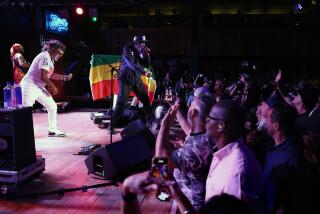SOUNDING OUT RIGHT MIX MEANS PLAYING IT BY EAR
- Share via
SOLANA BEACH — Sitting behind the sound board at the Belly Up Tavern, across the dance floor from the stage, audio engineer Tyler Buckley is frantically trying to get the bass player to turn down his amplifier.
He motions with his hands, he points to his ears, he whispers into the microphone that lets him communicate directly with the band through the stage monitors.
But each request, though acknowledged with a nod, is ignored. So with a sigh of exasperation, Buckley finally switches off the bass input line completely, leaving the obstinate bassist on his own.
“Each instrument is plugged into an individual stage amplifier as well as the sound board,” Buckley explained later. “What the audience hears is a balance between the two.
“The bass player’s amp was turned up much louder than everyone else’s, so there was no way I could include him in my mix and still keep the other instruments at their proper levels.
“I kept trying to tell him this, but when I failed to hear any noticeable difference I had no choice but to shut him off and let him play only under his own power. I just couldn’t compete.”
During his two years as the Belly Up’s chief audio engineer, or sound man, Buckley, 24, has found himself in hundreds of similarly frustrating situations.
His 24-channel Ramsa mixing console, or sound board, enables him to control volume, tone, balance and various special effects with the twist of a knob, the shift of a lever or the push of a button.
“I take what the musicians do on stage, put it through our system, and try to make it sound great, according to my ears,” Buckley said. “Nine times out of 10, the bands don’t have their own sound man, so it’s all up to me.
“Even if the bands do have their own sound man, I stick around and help him as much as I can. I know the room, I know the equipment, and after all this time, I’m familiar with just about every style of music out there--and what it takes to make it sound good.”
Each night, Buckley said, he arrives at the Belly Up an hour or two before show time “to meet with the band and try to establish some sort of rapport.”
“I use a lot of diplomacy,” he said. “I ask them what they want, and I explain to them what I can do, and what they can do to make my job a little easier--like turning down their amps.”
The night of his run-in with the stubborn bassist, Buckley was playing his mixing console like a keyboard, with the flair of Elton John and the studied intensity of Chopin.
“I’m constantly changing and adjusting my mix,” he said, twisting knobs, shifting levers, pushing buttons. “Every style of music is different, every band is different, every song is different.
“Besides, I like to play, too. If something sounds wimpy, I can easily make it sound bigger, fuller.”
Buckley’s finest work that night came during the guitar solos. While the guitarist’s fingers were furiously working on the strings, the sound man’s were just as furiously twisting the reverb knob on the sound board.
“If the guitarist is ripping out a solo and cramming a bunch of notes into it, I won’t do much,” Buckley said. “But if he’s breaking it down by holding onto each note, I like to add a little reverberation to pad the sound.
“A lot of times, I’ll play with the reverb knob and the crowd will go absolutely nuts. They think it’s the guitarist, but, actually, it’s me.”
Buckley is himself a musician. Between gigs as a drummer and harmonica player, he started working at the Belly Up three years ago, flipping burgers in the cafe.
“I would ask every band that came through if they needed a drummer,” Buckley said. “I ended up doing 13 weeks on a cruise ship with Stone’s Throw, a vintage jazz group.
“When I came back, I said, ‘Look, I love it here, but I really want to do something in music.’ So they (Belly Up management) gave me a shot behind the sound board--and I’ve been here ever since.”
His lack of formal training, Buckley added, hasn’t hurt him one bit.
“I rely primarily on my ears,” he said. “The technical stuff is valuable, and I’m constantly learning more about it, but for the most part, I just go by what sounds good.”
Occasionally, Buckley even gets the chance to play an instrument himself--not on stage, but from behind the sound board.
“Whenever the Bob Long Band comes through, I play a harmonica duet with Bob,” Buckley said. “He plays from stage, and I echo him from out in the audience, through my stage monitor mike.
“Aside from that, though, I learn a valuable music lesson from every band that comes through here. And after two years of sitting behind the sound board, I’ve learned from some of the best musicians in the business.”
More to Read
The biggest entertainment stories
Get our big stories about Hollywood, film, television, music, arts, culture and more right in your inbox as soon as they publish.
You may occasionally receive promotional content from the Los Angeles Times.










